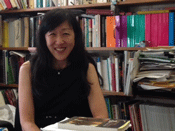
Using Film to Nurture ‘Theology from the Underside’
What are your favorite pastimes? Does it include a night with friends at your favorite restaurant or is it watching a movie at home, on the sofa, with snacks? Imagine your college class with movie and a grade. That’s the good life.
 Seminary life isn’t quite like that, but for one of my classes, it comes close.
Seminary life isn’t quite like that, but for one of my classes, it comes close.
One of my favorite classes is Theology from the Underside which examines how people in the underside understand creation, God, Christ, Spirit, scripture, salvation, community, suffering, hope, and life. African-Americans, Latin-Americans, feminists, womanists, Asians, and colonized groups engage in theology from their life experiences and context.
For the class on Postcolonial Theology I show the film Rabbit Proof Fence. This is the only film I show in its entirety. I ask the students to bring soda  and snacks and they settle into the classroom theater. It isn’t a popular movie so no student has ever seen it before my class.
and snacks and they settle into the classroom theater. It isn’t a popular movie so no student has ever seen it before my class.
Postcolonial theology is difficult to teach since the effects of colonialism are difficult for white Americans to grasp. I can lecture all day about the negative consequences of colonialism and many students will not believe it. They believe that colonialism is part of our present reality and cannot be changed. Even worse are students who believe it is part of that Rudyard Kipling world we left behind before WW I.
That is how they feel until they watch the movie Rabbit Proof Fence. It accomplishes something I cannot do with lectures. It conveys the raw, unsympathetic treatment that colonizers did to the colonized. The unjust, arrogant acts committed throughout human history in the name of imperialism are inhuman. The movie conveys this for me. Here is a clip from the beginning of the film which shows the agony of aboriginal children being taken from their families and brought up in residential Christian schools.
At the end of the film, no eyes are dry. I have to give the students 15 minutes to gather themselves as the movie is provocative, heart wrenching, and painful. At the end of the class, students see the world in a different way.
For me, when theology transforms your worldview so that you behave differently, I am fulfilled.

That’s a wonderful film to use! I also use “The Color of Fear”, “A Time for Burning” and “Mirrors of Privilege: Making Whiteness Visible” — all of which are documentaries.
Mary
Thank you for all your film suggestions. I hope many can use mine and your suggestions!
warmly,
Grace
Thank you for sharing this insightful article. I remember watching this film in one of your classes:Theology from the Underside–was catchy and touchy.I also recall seeing some of my class members stretching their hands into their hand-bags or pockets to get out handkerchiefs to dry their wet eyes:I mean tears!
Thanks Meza! It was always wonderful to have you in my classes. Wishing you the best as you study in Germany.